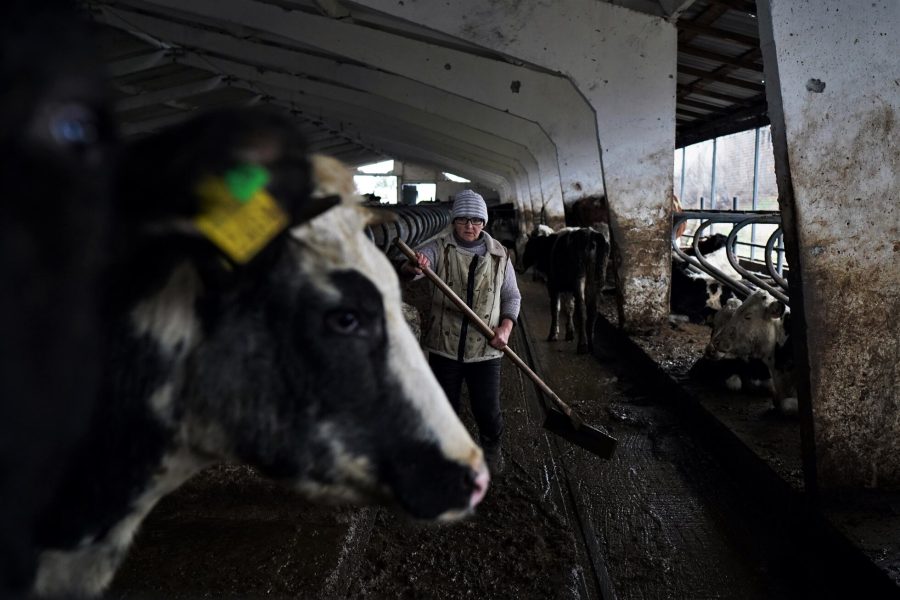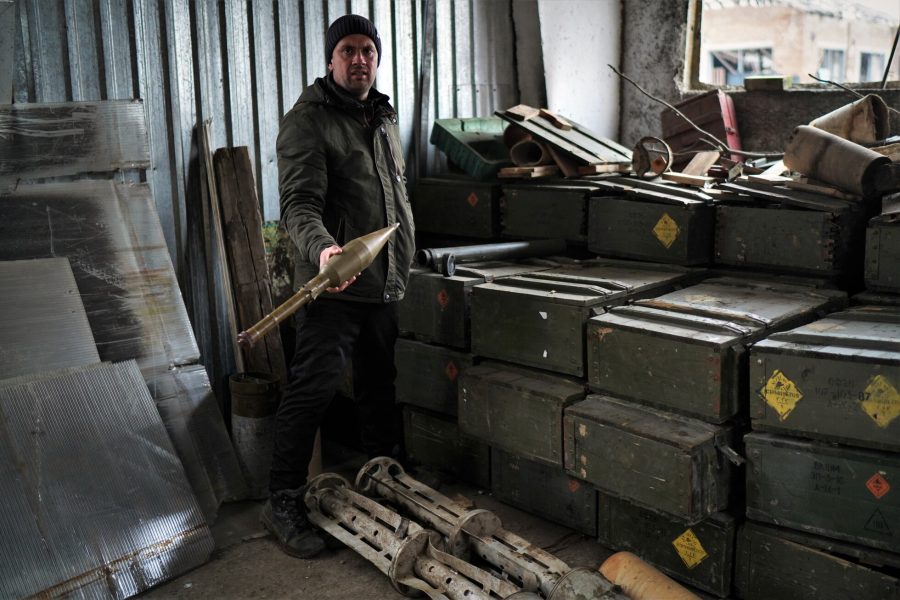How is the Russia-Ukraine war hitting Ukraine’s dairy farmers? What unexpected challenges are they up against, and how can they overcome them?

An employee works with some of the cows that survived the bombing at the Agrosvit farm, where 2,000 of the 3,000 animals died.
Imagine waking up one morning to find that your life’s work, family’s legacy, and primary source of income have all been torn apart by forces beyond your control. This is the harsh reality that dairy farmers in Ukraine are facing as the ongoing Russia-Ukraine war threatens their means of survival. Dairy farms, once the lifeblood of many rural villages, are now struggling to survive amid turbulence. Understanding the farmers’ struggles is not only important, but it also helps to comprehend the whole human cost of this battle. The war has significantly reduced the availability of critical resources such as feed, fuel, and equipment; farms have had their facilities and farms destroyed by bombings and military operations; and with markets failing and trade routes compromised, selling dairy products has become increasingly difficult. Interest is piqued. Pensive? Discover the whole story and why these dairy farmers now more than ever want your attention.
The Golden Era: A Glimpse into Ukraine’s Flourishing Dairy Industry Before the War
Before the Russia-Ukraine war, dairy farming was a key component and a cornerstone of Ukraine’s agricultural sector and overall economy. Ukraine was ideal for dairy production due to its fertile soil and pleasant climate—thousands of farms of all sizes exist. Ukraine, one of Europe’s largest milk producers, produces around 10 million tons of milk, according to data from the State Statistics Service of Ukraine. The significance of this industry cannot be overstated, and its current plight demands our immediate attention.
Dairy farming, a sector that employed hundreds of thousands of rural people and significantly contributed to Ukraine’s GDP growth, was a testament to the resilience and significance of the industry on both a financial and human level. The small family-run companies often passed down through generations, were not just businesses but also the heart of many rural communities, showcasing the farmers’ unwavering determination in the face of adversity.
Ukrainian dairy products were gaining traction in international markets, with export markets including surrounding European Union nations, the Middle East, and Asia. This growing international demand highlighted the strategic significance of dairy farming to the country’s trade balance. It underscored its potential for further growth and prosperity, offering a glimmer of hope amid the crisis.
The Ukrainian dairy business was on the verge of modernization and development before the storm that the war brought. Investments in advanced agricultural equipment, improved breeding processes, and the construction of new dairy facilities, including state-of-the-art cowsheds capable of housing thousands of cows, increased productivity and quality throughout the sector.
For many Ukrainian families, dairy farming provided a stable source of income. It served as a beacon of agricultural excellence, contributing to domestic food security and national economic stability. The pre-war dairy industry exemplifies Ukraine’s agricultural prowess and entrepreneurial spirit with its deep-rooted traditions, robust production competence, and active export potential.

Sergei Yatsenko displays ammunition left by the Russians after their month-long occupation of the farm.
War’s Brutal Toll: Ukrainian Dairy Farming Under Siege
The war’s immediate consequences are terrible for Ukraine’s dairy farmers. The ongoing battle has severely disrupted supply chains; damaged roads often prohibit milk delivery cars from completing daily rounds. These logistical challenges have made it impossible to transport dairy products, resulting in severe milk degradation that cannot reach processing facilities on time.
Infrastructure damage has exacerbated the situation. Shelling has wrecked barns and milking facilities on farms near fighting lines. “Our milking parlor was hit by a missile last month,” says Donetsk dairy farmer Ivan Hryhorowicz. “We lost some of our best cattle as well as the structure. It’s devastating.
Similarly disturbing is the human cost. Over 6.6 million people have been displaced, including many agricultural workers who used to work with cows. Because of labor shortages, farmers have been forced to work longer hours in more dangerous conditions. “We have mines spread over our fields,” adds another farmer, Oleksandr Mykhailenko. “Every step could be our last.”
Cattle losses are a common tragedy. Maintaining cattle health and output is difficult, given the disruptions in veterinary services and low feed supplies. There is a high emotional and financial cost. Oleksandr remarks, his voice somewhat depressed: “It’s not just a loss of animals; it’s a loss of livelihood and hope.”
Economic Turmoil: The Lifeblood of Ukraine’s Dairy Industry Under Siege
The economic catastrophe created by the ongoing war has significantly altered the landscape for Ukrainian dairy farmers. One of the most immediate and severe consequences has been the rapid rise in the price of essential products. Feed, necessary for supporting healthy and productive cattle, has skyrocketed in price due to disrupted supply lines and damage to agricultural infrastructure. Farmers struggle to locate competitively priced, high-quality feed, which affects their cows’ health and milk production.
Fuel costs have also skyrocketed since the war reduced the availability of energy suppliers. This is a devastating blow to a sector that relies heavily on fuel for milk delivery, feed transportation, and industrial operations. The six milk trucks previously used for successful distribution can hardly operate under the weight of these fuel expenditures, leaving farmers with a tough choice between maintaining daily operations and meeting necessities.
Maintenance and equipment expenditures are also growing substantially. Essential dairy farming equipment and normal agricultural activities are now out of reach for many people due to the difficulty of maintenance and replacement components. The capacity to sustain, much alone develop, dairy operations have been restricted as financial pressures mount. Farmers are caught in a vicious cycle in which their failure to invest in farm care exacerbates profitability and productivity.
This economic strain is a survival fight and a test of financial strength. Higher costs in all areas exacerbate the formidable challenge of existing amid a persistent conflict. Once the backbone of the country’s rural economy, Ukrainian dairy farmers are now fighting a losing battle through an economic minefield that threatens their way of life. Their struggle calls for our empathy and support.

Halyna Borysenko waits to milk cows at the KramAgroSvit dairy farm in Dmytrivka, Donetsk region, eastern Ukraine. One of the last working dairy farms in Ukraine’s eastern Donbas region is doing everything it can to stay afloat amid Russia’s devastating war where not even the cows are safe. “The animals are acting differently, they’re scared just like we are,” she said “They just can’t say it out loud.” (AP Photo/David Goldman)
The Labor Crisis: A Hidden Casualty of War in Ukraine’s Dairy Farms
The war’s harsh reality has exacerbated labor shortages; many workers fled to safer locations or were recruited to the front lines, leaving a significant gap in the workforce. The abrupt and widespread displacement has resulted in a substantial scarcity of educated staff required to operate dairy farms, which requires particular expertise and practical experience.
Many dairy farmers have been forced to train replacements with little to no agricultural expertise hastily. This results in inefficiencies and additional stress when veteran farmhands leave. Skilled staff are no longer widespread but are required for milking, herd management, and equipment maintenance. Farmers often rely on family members and a skeleton crew to fill positions, lowering overall dairy output quality and cutting productivity.
Dairy farmers must strike a careful balance between feeding animals, maintaining their farms, and ensuring continuous milk flow amidst ongoing economic and logistical disruptions. They see their already challenging challenges exacerbated by the labor crisis.
The Psychological Toll: Living and Working in a War Zone
Farmers and their families suffer mentally from living and working in a war zone, particularly one as volatile and unpredictable as the Russia-Ukraine battle lines. Aside from disrupting daily operations, the constant dread of shelling and explosives causes overall stress and anxiety in the area. Every day spent caring for the cows, regulating the limited quantity of fodder, or navigating the treacherous roads to ensure the milk trucks follow their itineraries is tinged with the continual fear of unanticipated danger.
Furthermore, the trauma experienced is more than simply a personal struggle; it impacts families and communities, eroding the trust and support networks that are often relied on in difficult times. Growing up in these settings exposes children to awful experiences and tales that they should not see. Such occurrences might leave psychological scars that manifest as nightmares, anxiety, and instability, making it difficult to focus on social development and schooling.
For farmers, the emotional burden is double. On the one hand, they are dealing with losing animals, equipment, and even family members or colleagues caught in the crossfire. On the other side, they are concerned about whether their prior line of employment, which promised stability and money, can endure the devastation caused by the conflict. Providing emotional and psychological support networks to these unsung heroes of Ukraine’s agricultural backbone is critical, as the constant state of uncertainty and worry may lead to chronic stress, depression, and other mental health issues.

Halyna Borysenko secures cows in their stalls for milking at the KramAgroSvit dairy farm in Dmytrivka, Donetsk region, eastern Ukraine. One of the last working dairy farms in Ukraine’s eastern Donbas region is doing everything it can to stay afloat amid Russia’s devastating war where not even the cows are safe. “The animals are acting differently, they’re scared just like we are,” she said “They just can’t say it out loud.” (AP Photo/David Goldman)
Amid the Chaos: How Ukrainian Dairy Farmers Are Mastering Adversity with Unyielding Resilience and Innovation
Many dairy farmers have shown incredible tenacity and innovation in the face of adversity despite hitherto unknown challenges. Adaptation is now a survival mechanism and proof of their continued viability. In response to supply chain disruptions and fuel shortages, some farmers modify their feeding strategies and use local resources better. This economy makes the most significant use of all available resources, ensuring its animals get the nutrients they need without relying too much on restricted outside sources.
Meanwhile, many people have turned to other marketplaces as a lifeline. Farmers establish direct-to-customer sales channels using local and regional marketplaces and bypassing traditional export routes. Some have even turned to online channels to attract customers, boosting their market share and ensuring continuous income. This transition keeps the economic wheels turning and builds links with local communities, who rely more and more on locally grown food.
Also vital has been community support. To weather the storm, farmers are banding together, sharing resources, and providing mutual help. Cooperative actions, such as sharing equipment or managing grazing areas, help to decrease individual losses while maintaining collective production. Local programs providing financial and mental health support help farmers navigate these challenging times more successfully.
These anecdotes demonstrate Ukraine’s dairy farmers’ extraordinary versatility. Their will to thrive in the face of hardship is a beacon of hope and inspiration, showing that creativity and community can enlighten the path ahead, even in the worst situations.
Global Solidarity: International Aid Pours into Support Ukraine’s Dairy Farmers Amidst War
While the crisis continues to wreak havoc on Ukraine’s dairy industry, the international community has provided critical assistance. Many international institutions and foreign governments have launched programs to mitigate the conflict’s devastating agricultural consequences.
Organizations like the United Nations Food and Agriculture Organization (FAO) have assisted. To ensure milk trucks can make their deliveries despite fuel shortages and the ongoing threat of shelling, the FAO has launched several emergency initiatives that provide feed, veterinary services, and even logistical aid.
The European Union has also undertaken targeted initiatives in tandem. The EU’s Rural Development Programme is one well-known effort that has been adjusted to aid dairy producers affected by the conflict with immediate technical assistance and financial support. Aside from helping to cover operating costs, this project aims to rebuild infrastructure harmed by ongoing hostilities.
Furthermore, the United States Agency for International Development (USAID) has allocated significant funds to assist Ukraine’s dairy industry. USAID has focused on providing farmers, notably dairy producers, with essential supplies such as feed, fertilizer, and seed, allowing them to operate their operations even under the most challenging situations.
On the ground, the Red Cross and various non-governmental organizations (NGOs) are constantly providing emergency help. These groups have pooled resources to give food packages, mental health support, and shelter to dairy farmers most affected by the dispute.
These global efforts are more than acts of goodwill; they demonstrate a genuine desire to ensure that Ukraine’s agricultural basis remains intact. This assistance is welcomed and critical for dairy farmers navigating these challenging conditions to protect their livelihoods and secure the future of Ukraine’s dairy industry.
Resilient Harvest: Ukraine’s Path to Rebuilding its Dairy Industry in the Aftermath of War
The Russia-Ukraine conflict will likely have long-term, significant, and diverse effects on Ukraine’s dairy industry. Years of industrial transition will undoubtedly be impacted by immediate and ongoing infrastructure damage, livestock loss, and economic suffering. Nonetheless, alternative recovery routes are achievable even if they are tough and depend on several critical factors.
First and foremost, significant foreign help and investment must be guaranteed. This flow of commodities might provide needed equipment, replace lost animals, and help to rebuild shattered infrastructure. Cooperative initiatives involving countries with advanced dairy agricultural technologies may also be beneficial since they give technical expertise and financial aid.
Second, it will be critical to address the war’s labor shortages. Programs aimed at training and retaining educated experts and incentives to encourage displaced farmers to return might assist in alleviating this situation. The rehabilitation of damaged communities, with the assistance of governmental and non-governmental organizations, will be critical to stabilizing the labor force.
Furthermore, cutting-edge agricultural practices and innovative concepts will boost sustainability and productivity. Precision agriculture and climate-resilient farming practices enable the utilization of resources and increase production even under challenging conditions. Technology-enabled monitoring of cow health and milk production has the potential to improve efficiency and decrease losses.
Furthermore, strengthening resilience in the local dairy industry via diversification would be critical. Farmers are encouraged to diversify their agricultural and animal holdings, which helps to offer a buffer against disruption. Combining dairy farming with other agricultural activities, such as crop farming and animal breeding, may result in more robust, self-sustaining farming ecosystems.
Finally, ensuring an uninterrupted supply of essential commodities, particularly fuel, will significantly impact recovery. Promoting policies prioritizing the agricultural sector for resource allocation will help stabilize existing operations and prevent future shortages that might derail recovery efforts.
Unquestionably, rebuilding Ukraine’s dairy industry is challenging, yet recovery is possible with proper planning and coordinated efforts. Ukraine’s dairy farmers can restore their sector to its former glory and pave the way for a more resilient and innovative future by learning from the past and enlisting international assistance.

Oleksandr Piatachenko pauses for a moment from sweeping hay at the KramAgroSvit dairy farm in Dmytrivka, Donetsk region, eastern Ukraine. “If there were no farming, there would be no work. There isn’t any public transport or buses around. You just can’t go and find a new job even if you want to,” said Piatachenko. (AP Photo/David Goldman)
The Bottom Line
The underlying foundation of Ukraine’s dairy industry has been tested to its limits in the face of unprecedented instability produced by the Russia-Ukraine war. From rising financial difficulties to continuous dangers to cattle and farmers, every facet of dairy production grapples with the harsh reality of war. The unwavering determination of Ukrainian farmers who, among the chaos, are redefining endurance and innovation makes their struggle compelling. Despite harsh conditions, expensive feed and veterinary care costs, labor shortages, and psychological stress, these farmers adapt and persevere. Let us analyze the future of Ukraine’s dairy industry and ask ourselves: How can we build a more robust support system for people who keep our planet running in such harsh conditions? We can rebuild and maintain Ukraine’s agricultural history with conscious effort and collective commitment.
Key Takeaways:
- Before the war, Ukraine’s dairy industry was experiencing significant growth and technological advancements.
- The conflict has severely disrupted dairy farming operations, causing widespread economic instability and reducing production capacity.
- Labor shortages have emerged as many workers were either drafted or fled the conflict areas, crippling farm productivity.
- Farmers deal with the psychological strain of working under constant threat and living in a war zone.
- Despite adversity, Ukrainian dairy farmers demonstrate remarkable resilience and innovation to sustain their livelihoods.
- International aid is vital in supporting these farmers by providing essential resources and financial assistance.
- There are promising signs of recovery as the global community rallies behind Ukraine, offering hope for the future of its dairy industry.
Summary
The ongoing Russia-Ukraine war has profoundly disrupted lives and industries across Ukraine, with the dairy farmingsector facing some of the harshest repercussions. Once a thriving industry, Ukrainian dairy farms now wrestle with logistical nightmares, economic hardships, labor shortages, and the relentless psychological strain of operating in a conflict zone. Resources such as feed, fuel, and equipment have dwindled, infrastructure has been destroyed, and many agricultural workers have been displaced or recruited to the front lines. Despite these challenges, stories of resilience and innovation exemplify the indomitable spirit of Ukrainian farmers. International support provides a lifeline, offering critical aid and resources to sustain operations and foster recovery as the nation looks toward rebuilding.












